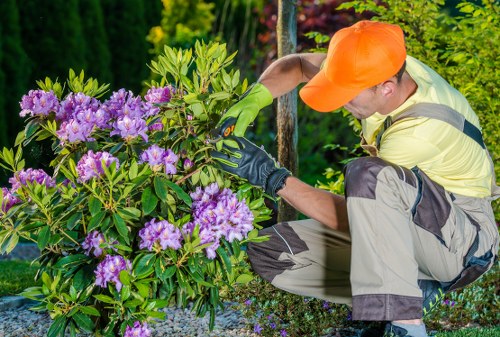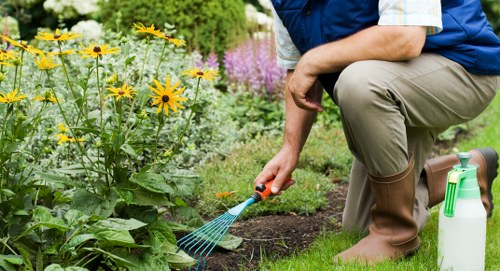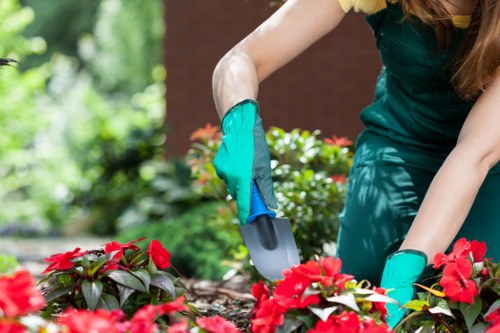Ultimate Guide to Garden Maintenance in Cranford
Introduction to Garden Maintenance

Maintaining a beautiful garden in Cranford requires dedication, knowledge, and the right tools. Whether you're a seasoned gardener or a beginner, understanding the essentials of garden maintenance can transform your outdoor space into a thriving oasis.
Garden maintenance encompasses a variety of tasks, from basic watering and pruning to more complex activities like soil testing and pest control. Each task plays a crucial role in ensuring your garden remains healthy and vibrant throughout the year.
In Cranford, the climate and local conditions influence the best practices for garden maintenance. By tailoring your approach to the specific needs of your garden, you can achieve stunning results with less effort.
Seasonal Garden Maintenance Tips

Adapting your garden maintenance practices to the changing seasons is vital for sustained garden health. Each season presents unique challenges and opportunities for your garden in Cranford.
Spring: This is the time to prepare your garden for growth. Begin by cleaning up any debris, pruning dead branches, and preparing your soil for planting.
Summer: Focus on regular watering, weeding, and pest control. Ensure your plants receive adequate sunlight and consider using mulch to retain moisture.
Autumn and Winter Maintenance

As the weather cools, shift your focus to preparing your garden for the dormant months. Remove any spent plants, protect sensitive species, and plan for next year's garden layout.
Winter might seem like a quiet period, but it's essential to perform tasks like pruning and soil testing to ensure your garden is ready for spring.
Implementing these seasonal strategies will help your garden thrive all year round.
Essential Garden Tools and Equipment

- Pruners: For trimming and shaping plants.
- Garden Hose: Ensures consistent watering.
- Soil Tester: Helps in assessing soil health.
- Wheelbarrow: Facilitates easy transport of materials.
- Weeder: Keeps your garden free from unwanted plants.
Investing in high-quality tools can make garden maintenance more efficient and enjoyable.
Regularly maintaining your tools ensures they remain effective and safe to use.
Soil Health and Fertilization

The foundation of a healthy garden lies in its soil. Understanding soil composition and quality is crucial for optimal plant growth.
Conducting a soil test will provide insights into pH levels, nutrient deficiencies, and other important factors. Based on the results, you can amend your soil with the necessary fertilizers to create a conducive environment for your plants.
Organic fertilizers are often preferred as they improve soil structure and promote beneficial microbial activity.
Pest Control Strategies
Pests can wreak havoc on your garden if not managed effectively. Implementing integrated pest management (IPM) techniques can help keep pest populations under control while minimizing environmental impact.
Regular monitoring, promoting natural predators, and using eco-friendly pesticides are key components of an effective pest control strategy.
Early detection and proactive measures are essential to prevent severe infestations.
Watering and Irrigation
Proper watering is fundamental to garden maintenance. Overwatering can lead to root rot, while underwatering can stress plants and inhibit growth.
Implementing an efficient irrigation system, such as drip irrigation, ensures that your plants receive the right amount of water without wastage.
Mulching around plants helps retain soil moisture and reduces the frequency of watering required.
Pruning and Trimming
Regular pruning and trimming are essential for maintaining plant health and aesthetics. Removing dead or diseased branches encourages new growth and prevents the spread of diseases.
Understanding the specific pruning needs of different plants ensures that you don't inadvertently harm them.
Pruned plants tend to flower and fruit better, enhancing the overall beauty and productivity of your garden.
Weed Management
Weeds compete with your garden plants for nutrients, water, and sunlight. Effective weed management is crucial to maintaining a healthy garden.
Regular weeding, mulching, and using landscape fabric can help suppress weed growth.
Consider organic weed control methods to maintain an environmentally friendly garden.
Mulching Benefits
Mulching offers numerous benefits, including moisture retention, temperature regulation, and weed suppression.
Organic mulches, such as bark or compost, also enrich the soil as they decompose.
Applying mulch around your plants can significantly reduce maintenance efforts and improve plant health.
Choosing the Right Plants for Cranford
Selecting plants that are well-suited to Cranford's climate and soil conditions is vital for a successful garden.
Consider native plants as they are adapted to the local environment and require less maintenance.
Additionally, choosing a mix of perennials and annuals can provide continuous blooms and foliage throughout the seasons.
Native vs. Non-Native Plants
Native plants are generally more resilient and easier to maintain, making them an excellent choice for Cranford gardens.
Non-native plants can add unique colors and textures but may require more care and resources to thrive.
Balancing both types can create a diverse and attractive garden landscape.
Lawn Care and Maintenance
A well-maintained lawn is a cornerstone of any garden. Proper lawn care involves mowing, fertilizing, aerating, and pest control.
- Mowing: Regular mowing keeps the grass at an optimal height for health and appearance.
- Fertilizing: Provides essential nutrients for robust grass growth.
- Aerating: Improves soil aeration and root development.
- Pest Control: Protects your lawn from harmful insects and diseases.
Implementing these practices will ensure your lawn remains lush and green throughout the year.
Grass Types Suitable for Cranford
Choosing the right grass type is essential for minimizing maintenance and maximizing beauty. Cool-season grasses such as Kentucky bluegrass, perennial ryegrass, and fescues are ideal for Cranford's climate.
These grasses thrive in the cooler temperatures and provide a durable and attractive lawn.
Consulting with local nurseries can help you select the best grass variety for your specific needs.
Garden Design and Layout
An effective garden design enhances both functionality and aesthetics. Thoughtful layout planning ensures that each plant has adequate space to grow and that the garden remains visually appealing.
Incorporate pathways, seating areas, and focal points to create a cohesive and inviting outdoor space.
Utilizing raised beds or container gardening can also add versatility to your garden layout.
Incorporating Hardscaping Elements
Hardscaping elements like patios, decks, and garden borders add structure and definition to your garden. They provide functional spaces and enhance the overall landscape design.
Select materials that complement your garden style and withstand Cranford's weather conditions.
Properly integrated hardscaping can elevate the beauty and utility of your garden.
Sustainable Gardening Practices
Embracing sustainable gardening practices not only benefits the environment but also promotes a healthier garden. Techniques such as composting, rainwater harvesting, and using organic fertilizers contribute to sustainability.
Planting drought-resistant species and reducing chemical usage further enhance the eco-friendliness of your garden.
Implementing these practices ensures long-term garden health and reduces your ecological footprint.
Composting for Soil Enrichment
Composting recycles organic waste into valuable soil amendment, enriching your garden's soil with essential nutrients.
Creating a compost bin is simple and provides a steady supply of compost to support plant growth.
Regularly adding kitchen scraps and garden waste to your compost pile accelerates the decomposition process.
Dealing with Common Garden Problems
Even with meticulous maintenance, gardens can face challenges such as pests, diseases, and environmental stress. Identifying and addressing these issues promptly is crucial.
- Pests: Use natural predators and organic treatments to manage pest populations.
- Diseases: Remove affected plants and employ preventive measures to curb the spread.
- Environmental Stress: Protect plants from extreme weather conditions with appropriate coverings and shelters.
Being proactive in managing garden problems ensures sustained plant health and beauty.
Integrated Pest Management (IPM)
IPM combines biological, cultural, and chemical practices to control pests effectively and sustainably.
Regular monitoring and accurate identification are the first steps in an IPM approach.
By integrating multiple strategies, you can achieve balanced pest control with minimal environmental impact.
Hiring Professional Garden Maintenance Services
While DIY garden maintenance can be fulfilling, hiring professional garden maintenance services in Cranford offers numerous benefits.
Professionals bring expertise, experience, and the right tools to handle all aspects of garden care efficiently.
They can provide tailored maintenance plans that align with your garden's specific needs and your personal preferences.
Benefits of Professional Services
Professional garden maintenance services ensure consistent and high-quality care, saving you time and effort.
They stay updated with the latest gardening techniques and can address complex issues that may arise.
Additionally, professionals can enhance the overall design and functionality of your garden.
Cost-Effective Garden Maintenance Strategies
Maintaining a garden can be cost-effective with thoughtful planning and resource management. Prioritize tasks based on necessity and invest in durable tools and materials to reduce long-term expenses.
- DIY Tasks: Handle simple maintenance tasks yourself to save on labor costs.
- Resource Management: Utilize rainwater harvesting and composting to cut down on water and fertilizer expenses.
- Long-Term Planning: Choose low-maintenance plants and efficient irrigation systems to minimize ongoing costs.
Implementing these strategies can help you maintain a beautiful garden without breaking the bank.
Budget-Friendly Gardening Tips
Maximize your garden's potential while staying within budget by using recycled materials for garden structures and opting for native plants that require less water and maintenance.
Start seeds from cuttings instead of purchasing expensive plants, and consider community seed swaps to diversify your garden economically.
Being resourceful and creative in your gardening approach can lead to significant cost savings.
Innovative Garden Maintenance Techniques
Incorporate modern techniques and technologies to enhance your garden maintenance routine. From smart irrigation systems to vertical gardening, innovations can make maintaining your Cranford garden easier and more efficient.
Using technology to monitor soil moisture and plant health can optimize watering schedules and reduce resource wastage.
Exploring new gardening methods keeps your garden dynamic and adaptable to changing conditions.
Smart Irrigation Systems
Smart irrigation systems use sensors and automation to provide precise watering, ensuring plants receive the right amount of water at the right time.
These systems can be programmed to adjust based on weather conditions, reducing water usage and promoting sustainability.
Investing in smart irrigation not only conserves water but also contributes to a healthier garden.
Conclusion and Final Tips
Effective garden maintenance in Cranford involves a combination of regular care, strategic planning, and the adoption of sustainable practices. By understanding the unique needs of your garden and implementing the tips outlined above, you can enjoy a vibrant and thriving outdoor space throughout the year.
Remember, consistency is key. Regular maintenance prevents minor issues from becoming major problems, ensuring your garden remains a source of pride and relaxation.
If you find maintaining your garden challenging, don't hesitate to contact us today to learn how our professional services can help you achieve the garden of your dreams.